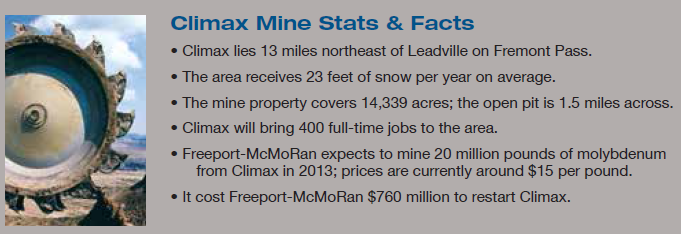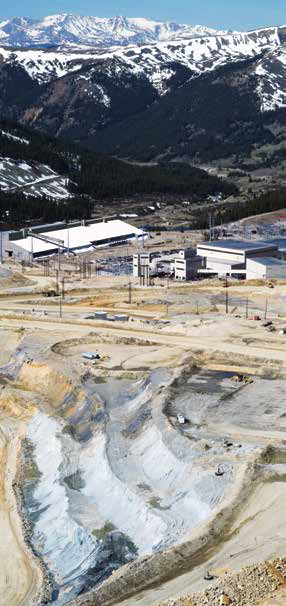With Climax Mine’s August 2012 reopening, molybdenum is again big business in Leadville. The mine largely ceased production 25 years ago thanks to the plummeting market for molybdenum, a metal used to strengthen steel. Recent development booms in countries like China, India, and Brazil have heightened steel’s demand, and Climax is back to grinding molybdenite ore on Fremont Pass.
Climax was never totally dormant. Water from the mine’s vertical shaft—which was allowed to flood with runoff and groundwater after Climax closed in 1987—has been continuously pumped and treated so that it wouldn’t overflow and send mining acids and trace metals into nearby watersheds.
Sitting at the headwaters of the Arkansas River, Tenmile Creek and Eagle River, Climax is the steward of roughly 30,000 acre feet of water annually, says Eric E. Kinneberg, spokesperson for Freeport-McMoRan Copper & Gold, the Phoenix-based company that owns the mine. Climax protects water quality using an array of practices that include recycling process water and treating water before discharging into streams, Kinneberg says.
“They seem to really be concerned about doing the right thing. When the new treatment facility goes into operation, it will be state of the art—there won’t be a facility like it anywhere in the country.” – Steve Swanson
In 2007, a new facility was built at Climax to clean up tailings pond water before it emptied into Tenmile Creek, where, if left untreated, its load of heavy metals could kill aquatic life. Now, Freeport-McMoRan is constructing a water treatment plant at the lowest part of the mine to intercept runoff from the entire site. Plus, it has installed monitoring wells the state will inspect quarterly.

“This site has been mined for 100 years, so there’s been a lot of contamination that has already occurred,” says Tony Waldron, a program supervisor in the Colorado Division of Reclamation Mining and Safety. “We want to make sure [Climax] isn’t excessively impacting groundwater.” The division is working to establish baselines to ensure the mine doesn’t exceed standards, which vary by watershed. “Surface water will definitely have to be treated in perpetuity,” he adds.
Steve Swanson, executive director of the Blue River Watershed Group, which works to protect water quality in Summit County, has been impressed with Freeport-McMoRan. “They seem to really be concerned about doing the right thing. When the new treatment facility goes into operation, it will be state of the art—there won’t be a facility like it anywhere in the country.”


 Print
Print